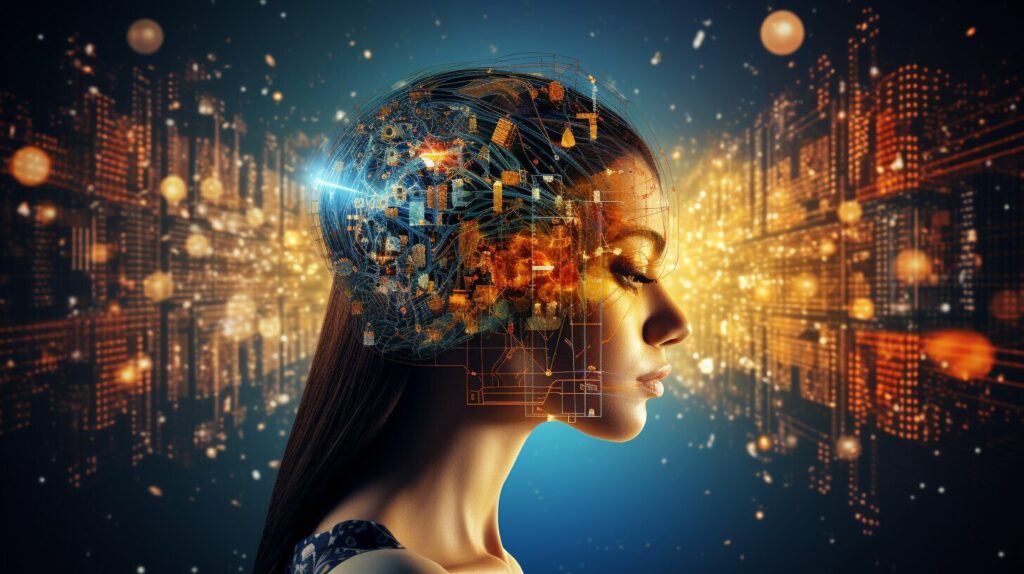
Welcome to an exciting era in advertising where technology is transforming the way businesses connect with their target audience. In this article, we will explore the power of machine learning in advertising and how it is revolutionizing the industry. Machine learning, a branch of artificial intelligence (AI), is paving the way for automated advertising and data-driven marketing strategies.
With machine learning, businesses can harness the power of AI to analyze vast amounts of data and gain valuable insights. This enables them to make informed decisions, predict customer behavior, and optimize their marketing campaigns for maximum impact. By leveraging automated advertising techniques and data-driven strategies, businesses can unlock their potential and reach new heights of success.
Throughout this article, we will delve into the definition of machine learning, its components, and its applications in various industries. We will also explore the importance of machine learning in AI marketing, the challenges faced by marketers, and strategies to overcome them. It’s time to dive into the world of machine learning and discover how it can supercharge your advertising efforts.
Understanding Machine Learning
Machine learning is a type of artificial intelligence that has gained significant attention in recent years. It involves teaching computers to learn and improve their performance without being explicitly programmed. At its core, machine learning relies on algorithms and statistical models to analyze and draw insights from data, allowing computers to recognize patterns and make predictions.
There are various types of machine learning algorithms, each with its own components and applications. Supervised learning algorithms learn from labeled data, whereas unsupervised learning algorithms discover patterns from unlabeled data. Reinforcement learning algorithms focus on maximizing rewards through trial and error. These algorithms, combined with predictive modeling techniques, enable machines to process vast amounts of data and make accurate predictions.
Machine learning plays a crucial role in diverse industries, such as healthcare, finance, and marketing. In the marketing domain, machine learning helps businesses analyze customer behavior, segment audiences, and personalize their marketing campaigns. By leveraging the power of machine learning, marketers can make data-driven decisions that lead to higher customer engagement and conversions.
Advancements in Artificial Intelligence
In recent years, machine learning has become an integral part of artificial intelligence. The ability to analyze vast amounts of data and extract meaningful insights has revolutionized the field of marketing. Marketers can now leverage machine learning algorithms to analyze individual customer behavior and preferences, allowing for personalized marketing messages and targeted offers.
Predictive analytics, enabled by machine learning, also helps marketers anticipate future outcomes and make informed decisions. By using historical data, machine learning models can identify patterns and trends, providing valuable insights that guide marketing strategies. With machine learning, marketers can optimize their campaigns, enhance targeting, and improve customer satisfaction.
In conclusion, understanding machine learning is essential for marketers seeking to leverage the power of AI in their marketing efforts. By embracing machine learning algorithms and predictive modeling techniques, businesses can unlock the potential to deliver personalized marketing messages, target the right audience, and optimize their marketing strategies for better results.
Importance of Machine Learning in AI Marketing
Machine learning plays a crucial role in driving success in AI marketing. Its ability to analyze individual customer behavior and preferences allows marketers to deliver highly personalized messages and offers. Through machine learning algorithms, businesses can gain valuable insights into customer data, enabling them to create targeted campaigns that resonate with their audience.
One of the key benefits of machine learning in AI marketing is enhanced targeting. By continuously re-evaluating the target audience based on real-time customer data, marketers can refine their strategies and ensure their messages are reaching the right people. This leads to more effective campaigns and higher conversion rates, ultimately driving revenue growth.
Predictive analytics is another powerful application of machine learning in AI marketing. By leveraging historical data and statistical models, marketers can make informed decisions and anticipate future outcomes. This enables them to optimize their marketing strategies, allocate resources effectively, and stay ahead of the competition.
The Power of Personalization
Personalization is at the heart of successful marketing, and machine learning makes it possible to deliver tailored experiences at scale. By analyzing vast amounts of data, machine learning algorithms can identify patterns and preferences, allowing marketers to understand individual customer needs. This enables the creation of personalized campaigns that resonate on a deeper level, increasing customer satisfaction and loyalty.
Furthermore, machine learning enables real-time decision-making, allowing marketers to respond to customer behaviors and market trends instantaneously. This agility is essential in today’s fast-paced digital landscape, where timely and relevant engagement can make all the difference.
In conclusion, machine learning is a game-changer in AI marketing. Its ability to drive personalization, enhance targeting, and enable predictive analytics has revolutionized the way businesses connect with their customers. By harnessing the power of machine learning, marketers can unlock new opportunities, optimize their strategies, and deliver exceptional experiences that drive results.
Challenges to Utilizing Machine Learning in Advertising
Implementing machine learning in AI marketing poses several challenges that marketers need to address. One of the primary challenges is dealing with the technical difficulties associated with implementing and maintaining machine learning models. This includes understanding the underlying algorithms, selecting the right model for the task at hand, and optimizing the model’s parameters to ensure accurate predictions.
Data quality and quantity is another significant challenge in utilizing machine learning in AI marketing. To train effective models, marketers need access to large volumes of high-quality data. However, it can be challenging to collect, clean, and integrate diverse data sources to create a comprehensive dataset for machine learning. Ensuring the integrity and consistency of the data is crucial for generating accurate and reliable insights.
Model selection is also a critical challenge that marketers face when incorporating machine learning into their AI marketing strategies. With numerous machine learning algorithms available, selecting the right one for a specific task can be complex. Marketers need to consider factors such as the type of data, the desired prediction or recommendation, and the scalability of the chosen algorithm.
Interpreting and communicating the results of machine learning models is another challenge in AI marketing. While machine learning can provide valuable insights, understanding and effectively conveying those insights to stakeholders is not always straightforward. It requires expertise in data analytics and the ability to present complex information in a clear and actionable manner.

Conclusion
Machine learning has revolutionized the advertising industry, offering numerous benefits and opportunities for businesses. By leveraging machine learning in advertising, marketers can enhance their campaigns and drive impactful results.
One of the key benefits of machine learning in advertising is the ability to personalize marketing efforts. With machine learning algorithms, marketers can analyze data and gain insights into individual customer behavior and preferences. This enables the delivery of personalized messages and offers, increasing customer engagement and satisfaction.
Additionally, machine learning in advertising improves targeting by reevaluating the target audience based on real customer data. By continuously optimizing campaigns based on machine learning insights, marketers can ensure more effective and efficient advertising strategies.
While machine learning brings significant advantages, it is important to acknowledge its limitations and challenges. Technical difficulties, data quality and quantity, model selection, and interpretation of results are among the challenges faced by marketers. Overcoming these challenges requires a culture of innovation, investment in resources, and adaptation to the changing role of PPC professionals.
Overall, machine learning is reshaping the advertising landscape and providing marketers with powerful tools for data-driven decision-making. By embracing and integrating machine learning strategies, businesses can unlock the full potential of AI in marketing, optimize their campaigns, and achieve greater success in reaching and engaging their target audience.
Related Post: The Best AI-Powered Sales Tools for Optimizing Revenue
FAQ
What is machine learning?
Machine learning is a type of artificial intelligence that involves teaching computers to learn and improve their performance without being explicitly programmed. It utilizes algorithms and statistical models to analyze and draw insights from data, allowing computers to recognize patterns and make predictions.
What are the different types of machine learning algorithms?
There are different types of machine learning algorithms, including supervised learning, unsupervised learning, and reinforcement learning. Each type has its own components and applications.
How does machine learning benefit AI marketing?
Machine learning allows marketers to analyze individual customer behavior and preferences, enabling the delivery of personalized messages and offers. It also enhances targeting by re-evaluating the target audience based on actual customer data, leading to more effective marketing campaigns. Additionally, machine learning enables real-time decision-making and predictive analytics, helping marketers make informed decisions and anticipate future outcomes.
What challenges are faced in implementing machine learning in AI marketing?
The challenges include ensuring data quality and quantity, selecting and optimizing the right model and parameters, interpreting and communicating the results of machine learning models, scaling and optimizing the models to handle large volumes of data, ensuring privacy and security of personal information, and addressing technical compatibility issues.

